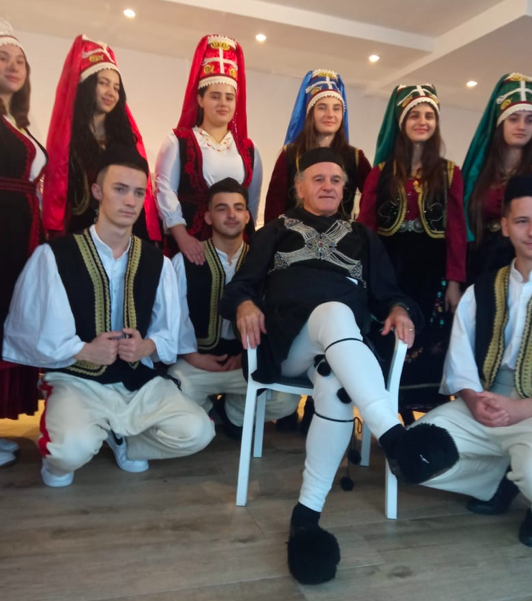Dec 29
Kristo Goci : The social status of Armanians/Aromanians of Albania

« Statutul aromânilor în Albania » : acesta este titlul intervenției în engleză al lui Kristo Goci la seminarul organizat anul trecut de Centrul internațional pentru minorități Convivenza la Müstair, în Elveția, pe tema îmbunătățirii vieții și instituțiilor popoarelor autohtone fără stat propriu în Europa. 35 de experți din 15 țări europene, reprezentând o duzină de comunități culturale și lingvistice fără stat propriu au participat la seminar. Prinre aceste popoare autohtone/comunități culturale și lingvistice se numără și aromânii. Despre ei au intervenit, în afară de Kristo Goci, Nicolas Caracota, Florentina Costea si S. Bletsas. Actele seminarului au fost publicate în cartea apărută anul acesta cu titlul Innovation and Learning to Manage Diversity in Governance, Raoul Blindenbacher (ed.).
Albania is part of Europe geographically and politically. Politically it qualified as such only after 1990 when it changed its social system from totalitarian communism to democratic pluralism, and relations in production from collective to private.
Thus, the closed Albanian society became open, based on European legislation that began to be implemented with the understandable difficulties that arose as a result of the marked backwardness inherited since the creation of the Albanian state in 1912. According to the assessment of the only census conducted in the period of democracy in 2011, the population structure of Albania was made up of the simple Albanian majority of about 98% and only 2% represented the population of 5 ethnic and ethno-cultural minorities.
It would not have been possible for the 1998 Framework Convention to have been ratified if the law 96/17 on National Minorities had not been adopted.
According to this law, 9 national minorities have already been recognized, one of which is the Armanian/Aromanian minority without a mother state. From 1990 until today, more than half of the Albanian population, more than two million people, have left the country as economic migrants. Of these, over 100,000 are Armanians/Aromanians. However, according to the official 2011 Albanian census, there are still about 10,000 people, while we are aware of the fact that there are many others not counted.
The traditional residential centers of the Armani Vlachs have shrunk but still exist in sufficient aggregations that the Framework Convention and law 96/2017 may be applied. Such centers are today in Selenica, Mekat, Armen, Bunavi, Bestrovë, Scrofotine, Vlora, Dukas, Kraps, Drizë, Fier, Div- jakë, Stan, Lushnje, Kavaja, Rreth, Durrës, Tirana, Elbasan, Grabovë, Nica, llenga, Pogradec, Mborje, Drenovë, Korcë, Kosinë, Badelonjë, Sheper, Permet, Nokovë, Dhoksat, Andon Poci, Gjatë, Kakoz, Mingul, Këllëz, Suhë, Stegopul, Gjirokastër, Stiar Xarrë, Shkallë, Bajkal and Sarandë.
In Albania, several associations have been established for the protection of the Armanian/Aromanian culture and language but they have not been able to withstand the lack of funds for development. This can be corrected by allocating, for the first time, a fund to the Committee for National Minorities.
The first test was conducted in April 2022 and it turned out that no association of all minority communities met the preconditions for the awarding of a grant due to lack of experience. Meanwhile, there are many purely non-minority associations that receive funding, but without successful implementation according to the needs of the community.
The experience of the seminars of the CONVIVENZA Foundation in Muster and Scuol has been very useful in the concrete approach to the implementation of projects, especially those for language learning that for us is an immediate need.
As a participant of the CONVIVENZA seminars, I forwarded the materials to the Committee for Minorities, which in turn, in cooperation with the «Armanji di Albanii» association, has prepared a round-table with all the leaders of the associations. The technique used by CONVIVENZA to determine the short and long term needs of the community was impressive and will serve us in our work in the future. The meeting of minority experts from all over Europe and the high level of speakers are important factors in synthesizing development problems.
We will use the lessons learned in the seminar in all our work, starting with electronic media with on-line language learning, taking advantage of the experience of the Romanian Vlachs in this field.
It is important to keep in touch with official state supporters such as the Ministry of Education and education directorates to start the process of drafting and printing books and further to start the teaching process in schools as a state obligation, wherever it is possible to be realized. One such meeting was held in April 2022.
A meeting of the representatives of the minorities of Albania was held with the representatives of the OSCE in Tirana, where the cooperation route for all the problems that motivate us was clarified. Concretely, we will come together in meetings with the minority communities. This cooperation will serve to raise public awareness about the October 2022 census.
A worrying problem for the Albanian Armanian community remains the official illegal intervention of the Romanian government in our associations in order to replace our Armani/Aromanian ethnicity and language with Romanian. This action contradicts the historical truth, our cultural associations and the decision of the Albanian state for the concrete recognition of our minority in Albania, which possesses a very special ethnicity and language and independence from any other language and nationality. The facts of the Romanian intervention have been collected over the years and we have constantly denounced them in the media and at European institutions.
